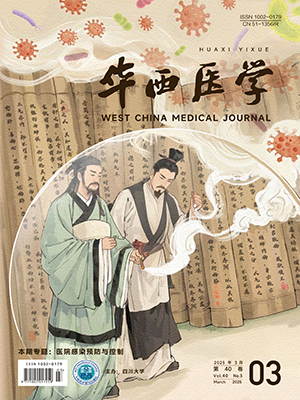| 1. |
Li N, Liu M, Wang D, et al. Comparison of complications in one-stage bilateral total knee arthroplasty with and without drainage. J Orthop Surg Res, 2015, 10: 3.
|
| 2. |
Kurtz SM, Ong KL, Lau E, et al. International survey of primary and revision total knee replacement. Int Orthop, 2011, 35(12): 1783-1789.
|
| 3. |
Anie KA, Grocott H, White L, et al. Patient self-assessment of hospital pain, mood and health-related quality of life in adults with sickle cell disease. BMJ Open, 2012, 2(4): e001274.
|
| 4. |
Sandhu S, Veinot P, Embuldeniya G, et al. Peer-to-peer mentoring for individuals with early inflammatory arthritis: feasibility pilot. BMJ Open, 2013, 3(3): e002267.
|
| 5. |
王海燕, 许燕玲, 胡三莲, 等. 中文版康复自我效能感量表的信效度评价. 中华现代护理杂志, 2014, 20(3): 268-270.
|
| 6. |
范建萍, 吴沛霞. 妇科腹腔镜术后患者主诉疼痛与护理评估结果的比较. 解放军护理杂志, 2012, 29(10): 29-31.
|
| 7. |
Lewis GN, Rice DA, Mcnair PJ, et al. Predictors of persistent pain after total knee arthroplasty: a systematic review and meta-analysis. Br J Anaesth, 2015, 114(4): 551-561.
|
| 8. |
李红. 电话随访式疼痛管理对癌痛患者镇痛药物治疗依从性的影响. 护理实践与研究, 2016, 13(8): 135-136.
|
| 9. |
童莺歌, 成燕, 刘冬华, 等. 术后疼痛护理评分与患者静息及活动性疼痛自评结果的比较. 护理学杂志, 2015, 30(6): 15-18.
|
| 10. |
王云霞, 李亚锋, 汤静. 急诊疼痛患者与护士疼痛评估的差异分析. 护理学杂志, 2015, 30(9): 51-52.
|
| 11. |
曾玉, 席淑新, 朱艳梅, 等. 成人低视力患者自我效能感与生活质量的调查分析. 中华护理杂志, 2013, 48(3): 197-199.
|
| 12. |
van den Akker-Scheek I, Stevens M, Groothoff JW, et al. Preoperative or postoperative self-efficacy: which is a better predictor of outcome after total hip or knee arthroplasty?. Patient Educ Couns, 2007, 66(1): 92-99.
|
| 13. |
王海燕, 许燕玲, 胡三莲, 等. 自我效能增强干预对膝关节置换术病人膝关节功能的影响. 护理研究, 2015(20): 2526-2528.
|
| 14. |
沈彬, 翁习生, 廖刃, 等. 中国髋、膝关节置换术加速康复——围术期疼痛与睡眠管理专家共识. 中华骨与关节外科杂志, 2016, 9(2): 91-97.
|
| 15. |
Werner BC, Evans CL, Carothers JT, et al. Primary total knee arthroplasty in super-obese patients: dramatically higher postoperative complication rates even compared to revision surgery. J Arthroplasty, 2015, 30(5): 849-853.
|
| 16. |
Yvonne D. Compact clinical guide to acute pain manage ment: an evidence-based approach for nurse. New York: Springer Publishing Company, 2011: 39-45.
|
| 17. |
代月娥, 文传兵, 刘慧. 老年人疼痛评估及治疗研究进展. 华西医学, 2009, 24(2): 517-519.
|




